“This is stunning. Memoir is such a fascinating genre isn’t it? And you write it brilliantly.”
Clover Stroud, Sunday Times Bestselling memoirist whose books explore life, death and everything in between. You can pre-order her new book, The Giant on the Skyline now
Hi friends,
Firstly, a gentle content warning if an exploration of grief and – specifically – bodies in death isn’t what you need to read about today. I’ll give you the heads-up further down before that section begins, and you can hit the heart and pop off.
If you’re a recent new subscriber (hello!), why not take a look at my Welcome post to give you an idea of what goes on here…
Welcome to What Now? with Lindsay Johnstone
“There is so much here for smart, creative women from this smart, creative woman, plus I have only just discovered Lindsay reading extracts from her powerful memoir – I am already hooked (and now a complete fan of her work).”
I’m writing my Sunday words to you early on Tuesday evening. I’m not long settled in my table seat on this 5.30pm London Euston to Glasgow Central Avanti West Coast train, having been in the city for a mere 26 hours for some London Book Fair-adjacent funs and to go to the Talk to your Baby conference run by the National Literacy Trust.
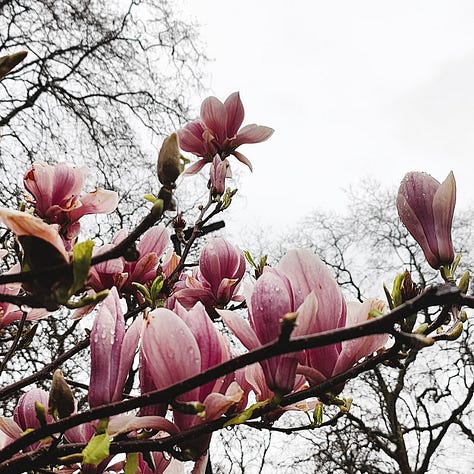
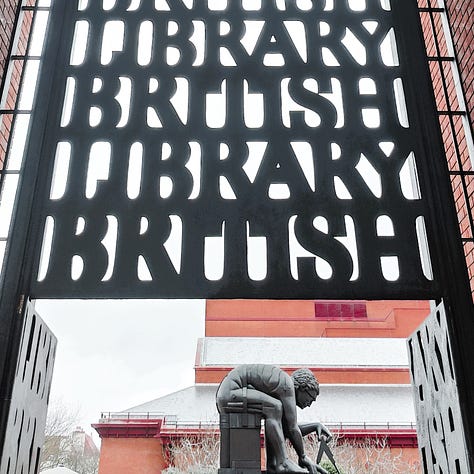
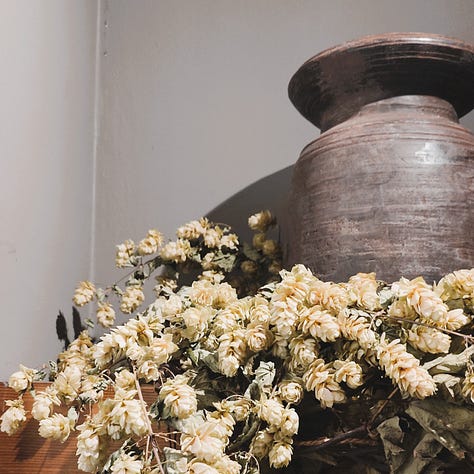
As expected, I’ve learned so much more about speech, language and communication in the womb and beyond, including how babies from as young as one month old can respond to humour, as well as emerging research on just how many synaptic connections are formed every second in the infant brain (we’d thought 75,000 for a while, and in my day job at Scottish Book Trust, have been telling our delegates this). However, now the accepted wisdom is it’s more like a million. If you are in the company of small people, and depending on your experience of those first thousand or so days, this intel will fill you with awe or concern.
Every. Second. Counts.
Skipping over that potential trigger, I enjoyed a pretty good catered lunch; the details of which my team expect a full debrief.
It’s often hard to find an unreserved seat on a late-afternoon service but today, being seatless isn’t the problem. I left the conference resolved to use the journey to first sense-check the episode of my memoir, Held in Mind, that I have scheduled for tomorrow morning (if you’re a new subscriber, extracts drop as weekly podcast episodes each Wednesday here for my Member community), and then get a few thousand words of my next non-fiction book proposal written. I’ve sacked the latter for now to preserve for posterity the kindly Joules-wearing woman opposite me.
Never has a late-middle-aged woman captivated me so completely.
She’d seemed like a safe bet, as far as travelling companions go. Not eating. A smile without eye contact as I sat down and flipped open my laptop. All good. Well, it was until Watford Junction.
I thought at first I should be worried for her; the eyes suddenly closed, the head and shoulders lurching forwards threatening a forehead injury on the grey table between us. But then she bounced back up, opened her eyes, shook her head and glanced – momentarily clear-eyed – out of the window. Just like that, she was taking a sip from from her Café Nero takeaway.
She continues to be truly astonishing and distracting. Is this narcolepsy in action? Something to do with her post-menopausal sleep-cycle? I don’t want to catch her eye during one of her lucid moments. She’s like one of those puppets you allow the strings to flop on before springing back to life with a quick flick of the wrist. And oh, her wee body warmer. The jaunty patterned shirt, the cubic zirconia necklace and its matching earrings. I seem to be developing a deep affection for my travelling companion, you see, ticks and all.
I know my own ticks. My hair twirling, my cheek biting, Even – I confess – my scalp scraping. They kick in when I’ve gone deep into the problem-solving stage of a project or when my hands are idle. When I catch myself, it can take all my efforts to stop.
That’s when it’s time to step away from the laptop. Get outside or pick up my knitting. Move my body or hands in deliberate ways.
And I’m sure beyond these three there are others I’m not entirely cognisant of. Things I do habitually that others might notice but which I don’t see. How aware are we really of how we are in the world?
What makes us us?
For instance, I have a friend who might not see herself as a slow person but I suppose I do. Do I find it annoying? Maybe a bit, but then perhaps I annoy her with my sudden lunges. The speed at which I go about the place. I know I’m one of those folk who’s always in motion. I see it recorded at our band practices when we film bits of the rehearsals where I contrast with the gentle swaying of my bandmates. This video is case in point.
Not that any of this is problematic, really. Being a mover makes me who I am and I wouldn’t change that even (or most especially) when my energies cause massive embarrassment to the girls when we bump into people we know. I choose to express my delight with some sort of dynamic movement and maybe an accompanying whoop if I’m really feeling it.
The point is that movement is what signifies our aliveness. Be it the simple rise and fall of our chest as breath enters and leaves the body or as shocking as the sight of a woman narc-ing across a train table or the complex, unseen sparking of synapses in a baby’s brain.
Movement makes us.
I did manage to sense-check tomorrow’s audio episode and bonus bits before I started to work on this, but in doing so, was struck afresh by a wave of grief. Because in listening back to an episode I recorded a while back, I realise I’ve brought my dad back to life. Reanimated him, ticks and all, much as this woman here in front of me ‘dies’ and then is revived.
And it’s fucking painful to listen to. Because with my/his voice directly in my earbuds, the mental video tape of him in life and in motion starts to play.
The fingers flick the lighter, the pen or the car keys.
The good foot taps.
The out of tune humming begins.
The episode that will have gone out by the time you read this is all about him. It’s the story of his young life and my attempt to understand a complex man and the conditions that led him to become an alcoholic. I wrote the words while he was still alive, and though I may well have written the scenes differently (and with more detail in places) were I to be writing the book now, what I wouldn't be capturing in the same way is the essence of him. His movement. His aliveness.
Do I need him now to stay dead, I wonder?
Episode Fifteen: Dad
It’s early March 2020. Lindsay tells her husband she’s going to be in more intensive therapy. She reflects upon the present-day relationship with her father and how she feels guilt that it’s her mother who now bears the brunt of her scorn. Lindsay and Steven go to see Scottish musician King Creosote perform at Glasgow’s Royal Concert Hall as the threat of COVID looms. She is thrust back half a decade as her emotions overwhelm her, remembering the first time she experienced this album and its accompanying film, From Scotland with Love by Virginia Heath, when things were very different for them all.
It was a lack of movement that, ultimately, forced me to believe in his death. The fact of it. I knew he had died, of course. I’d been told as much. His body had been removed from his flat after the doctors had signed the forms. It had been refrigerated at the undertaker’s while we planned the funeral. But it was only in being with his body the day before his cremation that I properly understood.
I don’t know if you’ve spent time with a dead body before. Dad’s was my first, which I found curious at nearly 40. It tells us something of how removed we are culturally from death. I don’t think that until then, and more recently as I’ve faced the images emerging non-stop from Palestine of mothers cradling their already-stiffened babies and toddlers, that I’d ever before allowed myself to consider the reality of being with a dead human body, either.
I knew it would be incredibly hard but that it was necessary for me. I remember the funeral arranger – a kindly woman – holding my forearm in the reception area of the funeral home when we arrived at the appointed time to ‘view’ him the day before the cremation.
“You’re not sure if you want to see Dad, are you?” she’d said. Not ‘your dad,’ but ‘Dad,’ as if he had been hers, too. This slip of the tongue had been annoying me for days, but I said nothing and just nodded. Ray and Kev went in first and I waited outside.
“It’s OK,” Ray said, poking her head back round the door. “He looks good.”
I was glad for her that she was getting what she needed. A big brother who looked better than he would’ve when she saw him last, naked from the waist down in his chair, dead for a good 36 hours at least.
But a body in death is not a body in life. In motion.
The way the viewing room was set up meant I saw his feet first. Not in the leather shoes Ray had thought fitting, but in the old soft slippers I’d fought for. His bad foot would be comfier that way, I’d said. I moved my gaze up to his wee legs, wasted inside the suit trousers. Next, his middle. The belly was odd. Strangely flat, which I’d later learn was down to what they do to dead bodies as part of the embalming process, which had I known then what I know now, I’d have declined.1
Next, hands. His always fidgeting, even after the rest of him slowed down. Still now in a way I’d never seen before. They’d been secured in a way he would never have clasped them. As well as the odd position, they were yellow and waxy poking out from the starched cuffs of his dress shirt. They’d not been made up. Perhaps the undertaker had forgotten we’d see them since we’d chosen a wicker basket with a full lid rather than a half-and-half (my elder daughter had asked why we didn’t go for the cardboard box option since he loved Amazon so much but the wait for one of those was weeks rather than days). His nails had gone black which I hadn’t expected either, but – spoiler alert – that’s what happens.
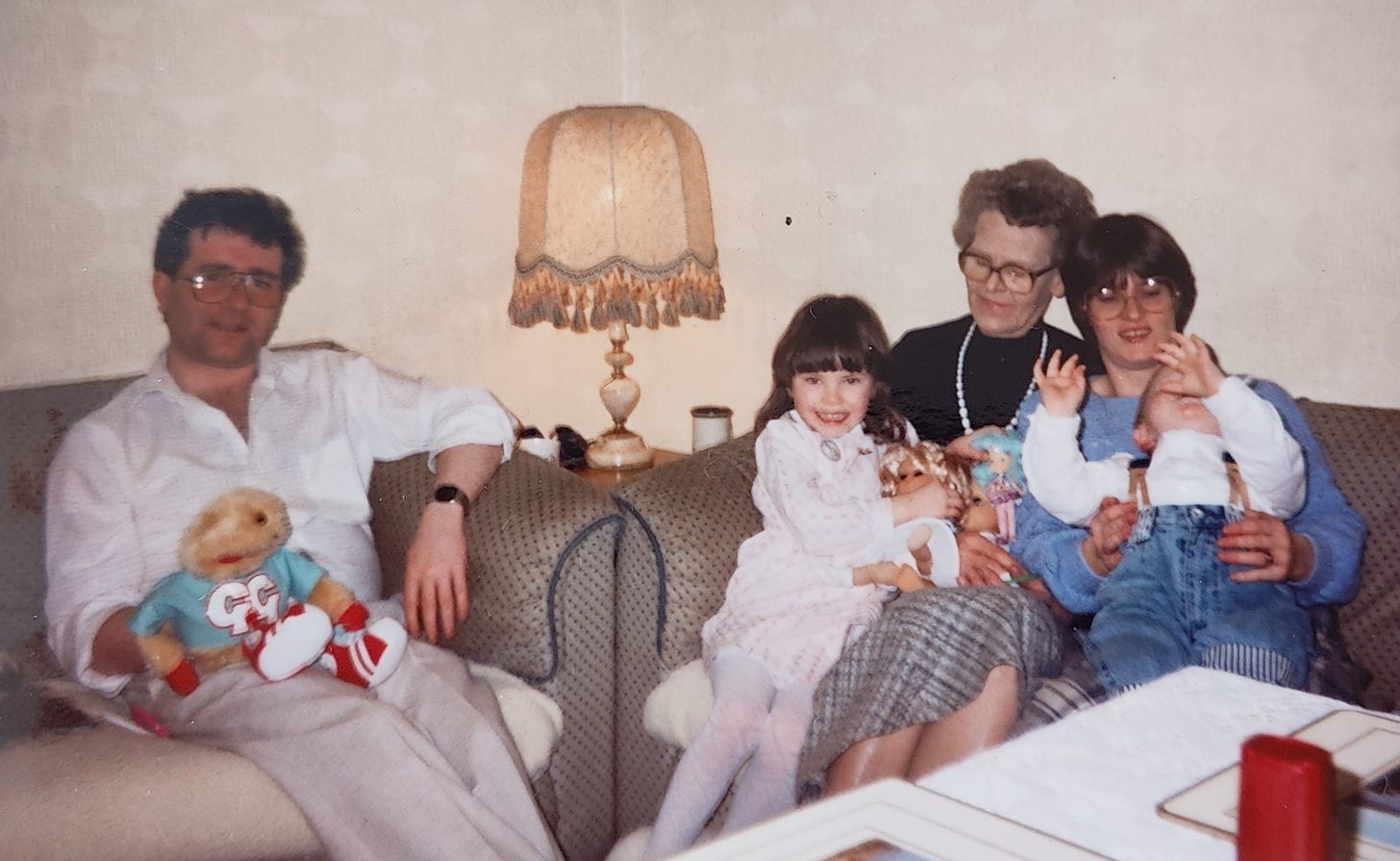
Finally, I took a moment and a very deep breath as I allowed myself to look at his face. Really look at it. Again, I don’t know if you’ve seen a dead person’s face once prepared by the undertaker. If you have, perhaps you’ll know what I mean when I say it’s them but not them. Even though they’d done a good job with his glasses, the makeup, the tape and the glue, there was no way that he could have been alive and sleeping. There was no mistaking it; this was his body but he was no longer it.
Now what I’d thought would be the worst bit was over, I made to place a few offerings between his hands. Just the half-empty pack of his favourite chewy sweeties that I’d taken from his dog-walking jacket and a picture of that wee dog. It was then that I was close enough to discover his body was the source of the cold I’d felt when I entered the viewing room.
This is what death feels like.
Ray and Kev soon settled themselves in the chairs over at the far side of the room, while I found myself unable to move. I needed to stand right there. Feel that chill. Watch for movement that my rational brain did not expect, but my emotional one still did. It would take time to absorb the deadness of him.
“If death is the absence of life, then death’s death is life.”
Sun Ra
Life to me, I learned, is heat. So death, then, is the absence of heat. Heat comes from movement. Sometimes we can see this heat being generated, sometimes we see it being lost. A body devoid of heat is one devoid of movement, seen and unseen. No firing synapses. No startle reflex. Certainly no flinching at a sudden noise. Though this last one proved hardest for me to comprehend. I found myself whispering. Shushing Ray and Kev before catching myself. What the fuck? His lips were glued shut.
We had arrived in three separate cars from three different places, converging for this last time in a way that was so familiar to the three (four) of us. Soon, we’d emerge from the funeral home into a hot June afternoon on the street where Ray’s hair salon had been in the 1980s. From an address that faced the leisure centre housing the swimming pool that we spent many Saturdays in with Mum and Dad when we were wee. A stone’s throw from the McDonald’s he’d take us to after a swim on those weekend afternoons.
But before that, and before we said goodbye to Ray, the two of us heading into that McDonald’s for an old-times portion of chips and a coffee, we had to say goodbye to Dad.
After hesitating about seeing him, it was me who struggled to leave. I was rooted in a way I couldn’t explain, my face wet as I studied his long after the other two had left the room. I was overwhelmed by the realisation that this would be the final time I would see him. The last time I would leave him, for it felt like I was the one doing the leaving, not that he’d already left us. This all might sound incredibly facile and yet it felt like I was understanding something profoundly life-changing in that moment.
I got to leave. I was able to move away. Move on.
I placed my open palm across his forehead. It was as cold and as hard as I needed it to be.
A couple of months later, I got up from the analyst’s couch for the final time, having decided to stick with the decision made back in May when we’d agreed the date of our final session. In analysis an ending is planned-for. Worked towards. You have time.to absorb the fact it's coming. Does that make it easier? She had offered me the chance to stay on, given recent events, but I knew I no longer needed it.
On the day itself, there would be no lingering moment; no drawing out of this goodbye. My fifty minutes were up.
“We are… at time for today,” she said in her usual way, “and this marks the end of our work together,” she confirmed, her voice soft in my ear just inches behind my head where she sat, observing me lying flat on her burgundy couch.
I took another deep breath, swung my legs over the side and stood up. I gathered my car keys from the low storage unit and turned to face her. We were rarely face to face.
She stood, too, and rather than head towards the door as usual, I took a step in her direction and hugged her on impulse, surprised to see her eyes were wet. It was the only physical contact we ever had and it was over in a flash. For the last time, I walked through the door, down the anaglypta corridor and into the rest of my precious life ready to live it. Embody it. Be fully me in it, which in that moment meant sobbing all the way home and feeling all the better for allowing yet more tears just come. I was crying for my endings, but also for my chance at a new beginning. I was so lucky. We are, all of us, so lucky.
Every. Second. Counts.
Lindsay x
ICYMI
I'd had my ending, or so I thought...
For the past 14 months, Dad has been stored in my brother’s garage alongside the Jumperoo and the lawnmower. Not long after his ashes had been collected from the crematorium, I’d gone over for a cup of tea, taking my chance to verify claims about the surprising weight of the box. Lifting the unbranded blue paper bag that midsummer afternoon, I was indeed taken aback by its heft. The solid density of it.
Read Smoke Gets in Your Eyes and Other Lessons from the Crematorium by Caitlin Doughty if you’re keen to know more about the mechanics and business of post-death as well as alternatives to embalming and trad funerals





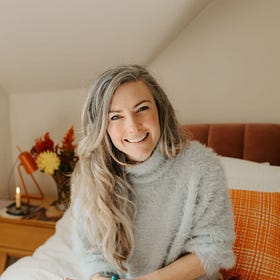

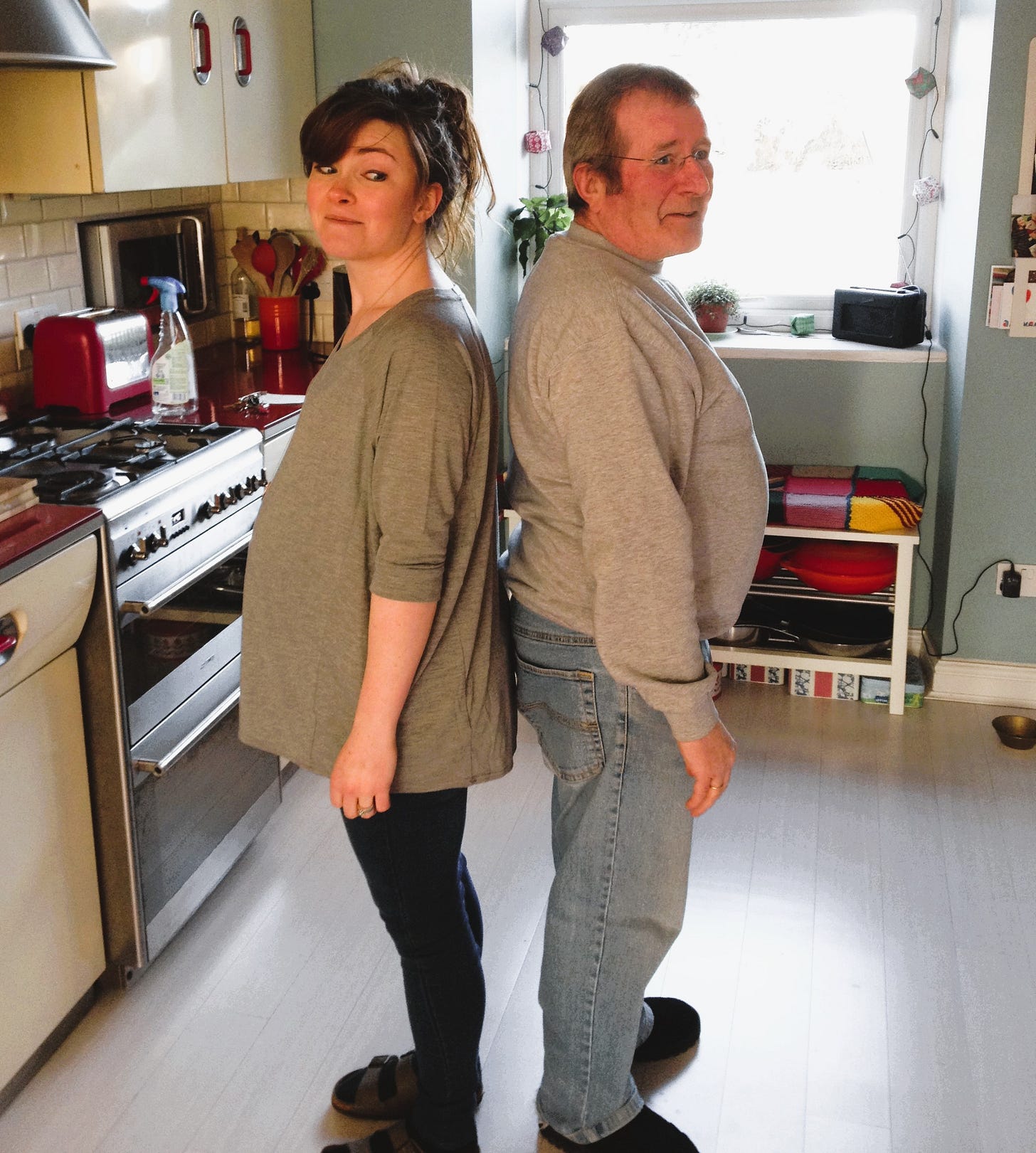
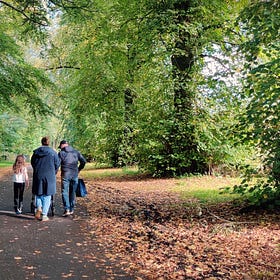
WOW. what a read. stunning and so moving … i loved the parallel of movement/aliveness and death/total stillness. and the movement of this piece too, from the woman on the train to your dad’s death to the ending in the psychotherapist’s office. you are right, we are so lucky. i think i probably think this every day, multiple times a day, and I’d rather remember it obsessively than forget. thank you Lindsay.
Thanks for sharing this Lindsay. RIP your dad, love the photo of your bumps! Death gets brushed under the carpet by most people which makes it harder for those of us who experience the gritty reality of it. For me my hardest was my own beautiful baby daughter stiff in my arms. I never told anyone tbh because it’s so horrible, but since you bring up the Gazan women…
It’s always a bitter sweet moment as therapy ends too, it’s the right thing but also a loss, for both. Also love your fabulous music! My aunt is a dance therapist and like you is always moving! 💛